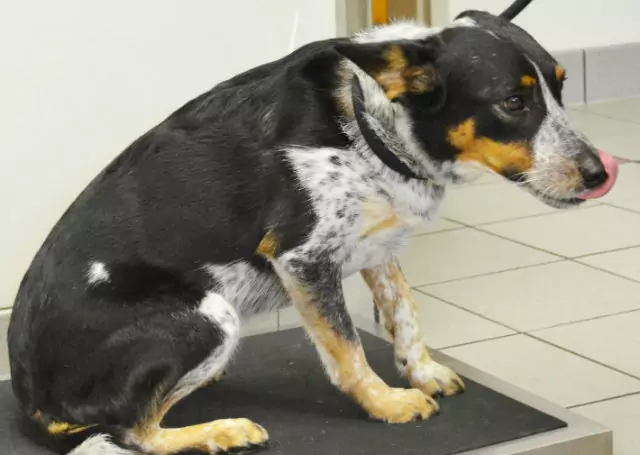Can dogs eat seafood? The benefits and risks of seafood for dogs
2022-07-08
Seafood is one of those things that people love to hate, and its deliciousness is often directly proportional to the risks of eating it. People salivate at the taste on the one hand and are alarmed by drafts, allergies, and parasites on the other. If we humans have to think twice before eating seafood, isn't it even more inappropriate for dogs, who we perceive as unfit to eat human food, to eat seafood?
I. The benefits and risks of seafood for dogs
Fish is often in the dog's repertoire, and much of it is seafood. This shows that at least some of the seafood species are edible for dogs. Most seafood is rich in nutrients and contains Omega-3 fatty acids that are difficult to get in other foods. It not only protects the heart to reduce the risk of cardiovascular disease but also contributes to the health of your dog's skin and coat. In addition, seafood is high in protein and low in fat, making it a relatively healthy food. Some dogs are allergic to other protein sources, so seafood can be a good source of protein.
Risks of seafood
Dogs eating seafood take the same risks as we do. First, seafood is a serious parasite and bacteria problem. Raw fish or sashimi, if not handled properly, dogs eat the risk of infection with bacteria such as salmonella and listeria. For some long-lived deep-sea fish, the body may also accumulate a variety of toxins, heavy metals, or other contaminants, and the dog's body has a bad impact. In addition, the content of vitamin A and protein in seafood is still relatively high, dogs may eat the risk of poisoning or allergies.
From the above, dogs eat seafood although there are benefits, but also many risks. So can dogs eat seafood or not? The answer is that they can eat some seafood (mainly fish). But even if dogs can eat seafood, the threshold for them to eat it is still relatively high, with owners handling the seafood well and controlling the portion size before eating it.

II. Those situations where dogs can eat seafood
Many owners worry that eating seafood will make their dogs allergic, but many different factors cause allergies in dogs ~
The allergens are different for each dog, and the common chicken and beef may also be the cause of your dog's allergies!
It is recommended that before feeding your dog seafood, give a small amount and observe the dog's eating condition to make sure there is no problem before increasing the amount.
Or ask a trusted veterinarian or nutritionist to give professional advice and instructions for individual dogs, or do allergen testing for your dog to clarify the real cause of the allergy.
Don't let your dog miss the opportunity to get quality nutrition because of myths!
Dogs will eat seafood diarrhea?
If your dog has diarrhea after eating seafood, there's a big reason why you've eaten unfresh seafood!
Not fresh seafood, often with parasites and salmonella and other harmful bacteria. Eat this kind of seafood even humans will run to the toilet, of course, will also let the dog diarrhea ah! In addition, the salt content of seafood itself is high, and cooking and seasoning will cause the dog intestinal burden, resulting in diarrhea problems.
So in addition to choosing a safe and fresh seafood source for your dog to eat, it is crucial to prepare fresh food dishes that are fully cooked and not seasoned! If the ingredients and cooking are confirmed to be fine, but your dog still has diarrhea, be sure to take your dog to the veterinarian as soon as possible to check if there are other health conditions!
Dogs eat seafood unhealthy?
It is absolute nonsense that seafood is unhealthy for dogs! Seafood can provide dogs with many high-quality nutrients, fish oil, and Omega-3 can not only maintain the dog's skin, and conditioning, but also the key to nerve cell flexibility in the brain, and these nutrients are not available in the meat Oh!
The collagen in fish skin can help maintain your dog's joints, and compared to pork and beef, the saturated fatty acids in seafood are much lower, which is relatively less burdensome to your dog's body!
It's not too late, let your dog eat seafood today, full of rich nutrition ~
How to eat seafood for dogs
The selection of seafood for dogs to eat must uphold the principle of fresh, safe sources.
Common salmon, cod, and swordfish are very suitable for dogs to eat seafood, owners should also try to avoid octopus, flower branches, shrimp, crab, and other ingredients!
Crustaceans such as shrimp, crab, etc., can easily lead to allergies, skin redness and swelling, mollusks such as octopus, flowering branches, etc., due to the more difficult to swallow the dog choke, indigestion Oh!
When cooking must also be fully cooked food, uncooked seafood is prone to parasitic suspicions, eaten down to the dog's health is not good at all, serious points may even cause dog life-threatening. In addition, the seafood itself contains high salt content, cooking must be boiled without adding seasoning to avoid excessive salt burden on the dog's body.
Before feeding the dog seafood owners must reconfirm that the bowl of fish spines and hard shells have been removed clean, these spines and hard shells will not only hurt the dog's teeth but also in the process of eating cut the throat and gastrointestinal, very dangerous for dogs to pay special attention.
The average dog is fed seafood 2 to 3 times a week, not only to select a new choice, but also to make the dog's nutrition more balanced, and the Omega 3 in seafood can also keep the dog's coat shiny yo!
3. Ideal seafood for dogs
1. Sardines
Sardines are often referred to as the healthiest fish in the sea because they are small, eat only plankton, and don't live long. In other words, this fish has fewer toxins built up in its body, but at the same time, it contains most of the nutrients that seafood has, making it an ideal choice for your dog.
2. Seaweed
Seaweed is a nutritious and healthy food for both people and dogs. Although there are many types of seaweed, the seaweed commonly found in supermarkets is edible for dogs. Adding a little seaweed to your dog's food can boost your dog's immune system.
The best seafood for dogs to avoid
1. crustaceans (shrimp, crab)
Shrimp and crab are common foods on our dinner table, but dogs should not eat much of them. Freshly processed crustaceans dogs eat a bite or two is no problem. But in large quantities, high sodium and high iodine shrimp and crab can easily lead to dog allergies, and shrimp also has a high level of toxins in the body, dogs should not eat more.
2. shellfish
The common shellfish on the dinner table is also best not to let dogs eat more. Shellfish also contains a lot of toxins, and some algae harmful to dogs may also be parasitic in it. For example, if a dog swallows a shellfish with methanogens in it, it may lead to paralytic shellfish poisoning.
Even if seafood is delicious and nutritious, owners still handle it carefully when giving it to their dogs. Only by controlling the amount and type of consumption, our dogs can enjoy good seafood as a delicacy.
Was this article helpful to you?
Other links in this article
português (Brasil):
Os cães podem comer frutos do mar? Os benefícios e riscos dos frutos do mar para os cães
中文简体:
狗能吃海鲜吗?狗狗吃海鲜的好处和风险
中文繁体:
狗能吃海鮮嗎?狗狗吃海鮮的好處和風險
Comments

Is a dog's mouth cleaner than a human's? Dogs' mouths need regular cleaning

Can dogs eat beans? Do dogs eat beans for health?

Can dogs eat lemons? Fruits that dogs should not eat more of

Do dogs have nightmares? Are dogs' dreams similar to humans'?

Can dogs eat raw beef? The benefits and drawbacks of beef for dogs

Is raw meat good for dogs? Can dogs eat raw chicken?

Can dogs eat pomegranates?

Can dogs eat ham?Can all types of ham hocks be eaten?

How to give a dog a bath

Can dogs eat kimchi?








